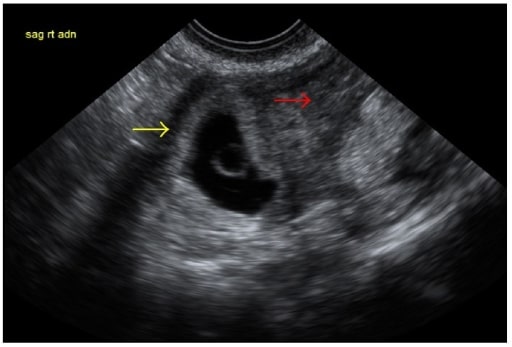Playlist
Show Playlist
Hide Playlist
Ectopic Pregnancy (Emergency Medicine)
-
Emergency Medicine Bord Ectopic Pregnancy.pdf
-
Download Lecture Overview
00:01 Hi. We’re gonna be talking about ectopic pregnancy. 00:05 What exactly is ectopic pregnancy? It’s basically a pregnancy that implants anywhere outside the uterus. 00:14 So the uterus is where the pregnancy should implant. 00:17 It’s important to note that this is the third leading cause of maternal mortality. 00:23 So especially a ruptured ectopic pregnancy can be very, very dangerous for a patient. 00:28 So we wanna make sure that when patients present in early pregnancy this is one of the things we’re considering. 00:35 Now, the incidence is approximately 10% of patients who presents to the Emergency Department with vaginal bleeding and abdominal pain in early pregnancy will have an ectopic pregnancy. 00:46 So this is not an insignificant number of patients. 00:49 It’s about 1 and 10 patients you present with these complaints. 00:52 And vaginal bleeding and belly pain in early pregnancy is a relatively common complaint that you may encounter in the Emergency Department. 01:01 Now, it’s important to remember that the first and single most important test you should get for woman of child bearing age when they come to the Emergency Department with abdominal pain is a pregnancy test. 01:14 You wanna tell that patient right away, that you want a urine sample to test whether or not they’re pregnant. 01:21 Especially, important for an unstable patient. 01:24 You wanna try and get that urine sample as quickly as possible. 01:28 If you’re not able to get a urine sample you can send a blood sample to test for pregnancy. 01:33 But this is the absolute single most important test that you can get. 01:37 It’s important to remember that when patient comes to the Emergency Department with vaginal bleeding and belly pain, some of them might actually not know that they're pregnant. 01:46 Some of them might not have had it be on their radar. 01:49 Some of them just maybe didn’t do a test yet. 01:52 So getting the test is very important. 01:55 It’s a cheap and easy test in the urine and ectopic pregnancy should not be missed. 02:02 Now, what are the risk factors for ectopic pregnancy? Who should we'd be thinking about this more in? One of the risk factor is the history of pelvic inflammatory disease. 02:11 So it’s a good question to ask if a patient has ever had the history of PID. 02:17 Asking them about chlamydia, gonorrhea, any kind of genital infection will point you in that direction. 02:24 PID increases the risk for an ectopic pregnancy three folds and represents 50% of the cases. 02:33 Now, in another lecture we'll talk about PID. 02:36 And this is one of the reasons that it’s so important to treat PID when you think that it's present or that when you recognize that's it's present. 02:43 Because by treating it that risk for ectopic pregnancy gets decreased as well. 02:48 Tubal surgery is another cause. 02:51 So patients who have had surgery on their fallopian tubes are present in about 25% of cases. 02:58 Especially in situation of prior ectopic pregnancy or sterilization procedure like getting their tubes tied. 03:05 Assisted reproduction with in-vitro fertilization or IOI is also another risk factor for ectopic pregnancy. 03:15 Prior ectopic pregnancy also puts people at increased risk. 03:19 And then an abnormal endometrium, so if anything is abnormal in the uterus, there’s a lot of fibroids, there’s endometriosis. 03:26 Any of those things can put the pregnancy at risk for implanting in the incorrect place. 03:32 Now, additional risk factors are smoking, advanced maternal age, so that’s patients who are you know over the age of 35, not an elderly patient of course. 03:43 Having an IUD in place, so having an IUD in place potentially might make the endometrium abnormal. 03:49 There’s a device in there and that can predispose to ectopic pregnancy and then also prior surgical abortion because that is essentially a disruption of that endometrium. 04:00 Where does the pregnancy implant? Most commonly pregnancies will implant in the fallopian tube. 04:08 But they also can implant in the cervix, in the cornua of the uterus which are basically the like corns, or horns of the uterus. 04:17 One is located in either side. 04:20 That’s basically where the uterus and the fallopian tube connect. 04:23 And in very rare cases it can present with the implantation in the peritoneal cavity. 04:31 So there could be an implantation in the abdomen itself. 04:34 A very key thing to remember is that pregnancy that’s implanted in the cornua can grow to larger sizes before causing rapture. 04:43 The reason for that is because that area can expand a little bit more than let’s say the fallopian tube. 04:48 The fallopian tube can’t grow to be a very big size. 04:51 You’re limited based on the size. 04:53 So when you have a cornual pregnancy that implants there. 04:56 That pregnancy can grow to a larger size and hence when it ruptures, because it is a bigger size, it can cause a lot more bleeding for patients and a very unstable patient. 05:07 So for cornual pregnancies, cornual ectopic pregnancies have a very low suspicion for getting that patient appropriate surgical intervention.
About the Lecture
The lecture Ectopic Pregnancy (Emergency Medicine) by Sharon Bord, MD is from the course Abdominal and Genitourinary Emergencies.
Included Quiz Questions
What is the first and most important laboratory test that must be requested on female patients of child-bearing age who present to the ED with abdominal pain?
- Urine HCG
- CBC
- Lactic acid level
- Amylase
- Lipase
Which of the following is the highest risk factor for an ectopic pregnancy?
- History of pelvic inflammatory disease
- Assisted reproduction
- Tubal surgery
- Prior ectopic pregnancy
- Abnormal endometrium
What is the most common location of an ectopic pregnancy?
- Fallopian tube
- Peritoneal cavity
- Cervix
- Cornua of uterus
- Ovary
Customer reviews
5,0 of 5 stars
| 5 Stars |
|
5 |
| 4 Stars |
|
0 |
| 3 Stars |
|
0 |
| 2 Stars |
|
0 |
| 1 Star |
|
0 |




